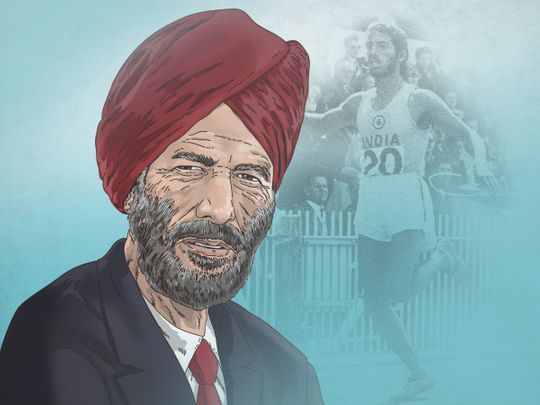
An obituary of him, up on the New York Times website on Wednesday, ran with a headline: ‘Milkha Singh, India’s post-colonial track star, is dead.’ It’s been almost a week that the legendary Indian athlete passed away, after having led a full life at 91 years, but the tributes haven’t stopped flowing.
Such was the stature of the man - regarded as the greatest ever athlete of India - a country which does not have much to write home about in this sport at the global or Olympics level - that it was satisfying to see one of the flagships of US mainstream media doing an appraisal of the man. And putting things in right perspective by calling Milkha one of India’s biggest post-colonial heroes.
This is what makes him much, much more than a runner - a cultural icon who defied the odds to keep India’s flag flying through the 1950s and ‘60s. It would be a sheer travesty of justice to just bracket him as the man who missed the 400 metres bronze at 1960 Rome Olympics by a whisker.
Global ambitions in athletics
He was a relic of the painful saga of undivided India’s partition, of showing the world that a callow Indian army runner can nurse global ambitions in athletics at a time when the country was barely known for it’s sporting prowess - barring hockey and football to a degree.
The achievements had been simply mindboggling for someone in that era - four gold medals at the Asian Games - two in 400m (1958, 1962), one in 200m (1958) and one in 4x100m relay (1962), the first Indian athlete to win a Commonwealth Games gold in 1958 and a phenomenal record of winning 77 out of 80 races in the build-up to Rome Olympics.
The manner in which Milkha prepared himself after the disappointment of 1956 Melbourne Games, where he failed to go beyond preliminary heats - spoke volumes about his urge to raise the bar from himself. Mind you, he was an Army officer and one of the leading sprinters of Asia by then but Milkha pushed himself to review his training in line with the highest international standards.
Under the mentorship of Charles Jenkins Sr, the 400m champion in Melbourne, he trained hard for Rome and was considered to be among the favourites for the quarter mile - always a marquee track event.
Rome, however, turned out to be the heartbreak of his career - something which haunted him for the rest of his life. He said later that it as only the second occasion when he cried, the first being after the loss of his parents in the partition violence. He missed the bronze by 0.1 second, clocking 45.6 seconds to finish the race.
“The one medal I had yearned for throughout my career had just slipped through my fingers because of a one small error of judgement,” he regretted in his autobiography later.
A watershed race
What exactly happened to him in that watershed race - an extraordinary one which saw all the top four finishers actually create world records in hand-held timings? When his biopic was being made by Bollywood filmmaker Rakeysh Omprakash Mehra more than half a century later in 2013, the impression one got was that he had a habit of looking over his shoulder at the last minute for his closest rival - which may have cost him the third place finish.
The film alludes it to nightmarish childhood memories of mob violence during the trauma of Partition - where he lost members of his family and ran for his life.
In the next four years, he did well to bring two more gold medals to the country at the 1962 Asian Games. However, the sprinter in him was on the wane and once the 1964 Tokyo Olympics finished on a disappointing note, he called it a day.
Beyond track and field, he engaged himself with sports administration in Punjab while son Jeev went on to be one of the barrier-breakers in Indian golf on the European Tour. However, there is a feeling that in later years, he could have been more generous in acknowledging the new talent and less churlish about his own feats.
The Flying Sikh
One instance which has been oft reported is his failure to accept gracefully that his 38-year-old 400 metres record was broken by Paramjeet Singh in 1998, when he didn’t honour his announcement of paying the full amount in case someone broke his long standing mark. Milkha’s contention was that the record should have been broken overseas, while the runner said no such clause was mentioned before.
It was a different generation and value system that he was born in pre-partition Punjab, where he first took to running at the promise of getting free milk to drink as a child. Otherwise, why would he charge a token fee of Rs one only (approximately five fills) to give permission to make a biopic on his life - a story corroborated by Mehra, the director of his biopic - when the story of his life had all the recipe of a gripping tale.
How did he earn sobriquet, ‘The Flying Sikh,’ which stuck to him till the end? Pandit Jawaharlal Nehru, India’s long-serving Prime Minister after the independence, had apparently persuaded him to visit Pakistan to take part in an Indo-Pakistan sports event. It was here that Milkha beat legendary Pakistan sprinter Abdul Khaliq in the 200 metres final.
General Ayub Khan, the then Pakistan president, called him the ‘Flying Sikh’ for his exploits on the track at the presentation ceremony - and it became his acronym for the next half a century!








